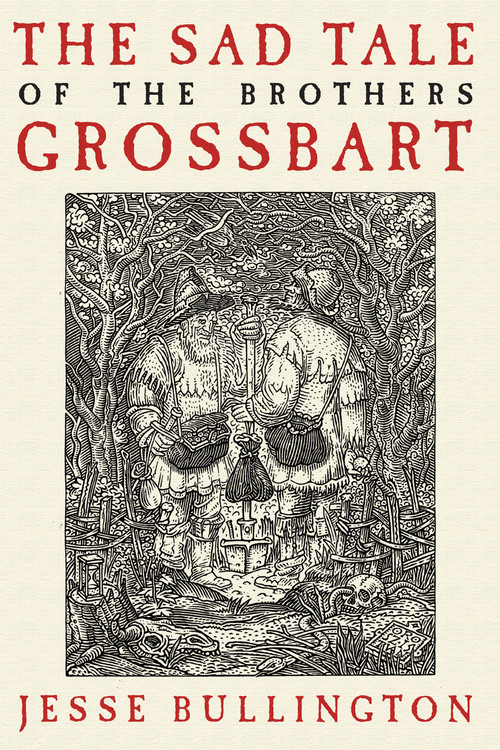
The Sad Tale of the Brothers Grossbart
کتاب های مرتبط
- اطلاعات
- نقد و بررسی
- دیدگاه کاربران
نقد و بررسی

September 7, 2009
With liberal inclusion of vomit, gore and turnips, Bullington's bizarre debut follows two monstrous siblings across 1364 Europe and the Middle East as they seek ever-richer graves to rob. The Crusades, the papal schism and the Black Death all make appearances, as do the obligatory witches, priests and knights. In addition to robbing, torturing and murdering innocent peasants, the brothers dispatch demons and imitation popes while debating theology and the nature of mercy, e.g., finishing a victim off rather than leaving him for the crows. The mix of grimmer-than-Grimm fairy tale tropes, spaghetti Western dialogue (“Yeah, can't suffer no traitorous churls to keep on bein traitorous”) and medieval history is striking and often funny, but it may not be compelling enough to keep readers slogging along with the brothers' endless travels and copious letting of bodily fluids.

September 15, 2009
Fantasy debut plunges viscerally into the depths of medieval nightmare.
Hegel and Manfried Grossbart are sincere (albeit highly unconventional) Mariolaters as well as murderous grave robbers. The German siblings travel across 14th-century Europe toward Egypt, where they believe a multitude of rich infidel tombs await them. Along the way, they confront plague-bearing demons, assorted other evil creatures and treacherous locals. Gaining enemies wherever they go, they beguile their journey with heavy drinking and profanity-laced, profoundly heretical theological debate. A dementedly vengeful farmer whose family the Grossbarts slaughtered follows in dogged pursuit. Deeply rooted in history and folklore, the novel is both earthier and far more cynical than the original versions of Grimms' fairy tales; it's a perverse Dark Ages anti-Candide, drenched with bodily fluids—blood, vomit, semen and plague bubo discharge, among others. Whether readers enjoy this amusing, skillfully distasteful experience depends on the strength of their stomachs and the extent of their tolerance for intimate acquaintance with unpleasant characters.
Discomfiting, disgusting and at times as grotesquely pleasurable as picking at a scab.
(COPYRIGHT (2009) KIRKUS REVIEWS/NIELSEN BUSINESS MEDIA, INC. ALL RIGHTS RESERVED.)

October 19, 2009
Hegel and Manfried Grossbart, two brothers in medieval Europe, are ugly, cruel, stupid, filthy, heartless, and murderous. But they have a certain moral code of sorts, boundless fortitude, and a blundering sense of adventure, which leads them to encounters with various witches and demons, each more hideous than the last. This debut novel is like the unexpurgated Grimm's fairy tales, as imagined by Chuck Palahniuk. Bullington has a great appreciation for the folklore, and readers will enjoy the evocative writing-if they can stomach the author's appetite for the bizarre. Verdict A zestfully grotesque adventure; not for the squeamish or faint of heart.-Jenne Bergstrom, San Diego Cty. Lib.
Copyright 2009 Library Journal, LLC Used with permission.

November 15, 2009
When the Brothers Grimm published their celebrated folktales, critics took aim at the inclusion of disturbing material unsuitable for children. Modeled after the grimmest of the Grimm tales, Bullingtons debut about a pair of villainous medieval brothers throws aside any concerns for children from the first chapter, aiming instead at gross-out horror fans. Aside from plundering graves and waylaying strangers, Manfried and Hegel Grossbarts one consuming interest is crossing plague-ridden fourteenth-century Europe to an imagined Egyptian palace, where their grandfather is hoarding stolen treasure. Along the way, the brothers cross paths with assorted brigands, witches, madmen, and fallen priests, robbing when expedient and killing where necessary. In one escapade, the Grossbarts incinerate the family of a neighboring farmer who mistreated them as children. In another, they befriend a priest who recounts his own horrific adventures during the Crusades. Bullington makes little attempt to cast his protagonists as sympathetic anti-heroes; the Grossbarts are cutthroats to the core. Yet Bullingtons masterfully engaging style marks him as a writer of considerable promise.(Reprinted with permission of Booklist, copyright 2009, American Library Association.)

























دیدگاه کاربران